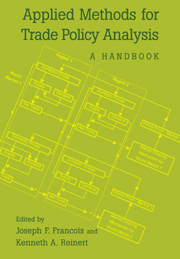Book contents
- Frontmatter
- Contents
- List of Tables
- List of Figures
- Acknowledgements
- List of Contributors
- A Note to Readers
- Dedication
- Part I Introduction
- Part II Basic Frameworks
- Part III Standard Applications
- Part IV Extensions
- 11 Scale Economies and Imperfect Competition
- 12 Capital Accumulation in Applied Trade Models
- 13 Dynamics of Trade Liberalization
- 14 Trade and Labor Market Behavior
- 15 Labor Market Structure and Conduct
- 16 Trade and the Environment
- Author Index
- Subject Index
16 - Trade and the Environment
Published online by Cambridge University Press: 05 June 2012
- Frontmatter
- Contents
- List of Tables
- List of Figures
- Acknowledgements
- List of Contributors
- A Note to Readers
- Dedication
- Part I Introduction
- Part II Basic Frameworks
- Part III Standard Applications
- Part IV Extensions
- 11 Scale Economies and Imperfect Competition
- 12 Capital Accumulation in Applied Trade Models
- 13 Dynamics of Trade Liberalization
- 14 Trade and Labor Market Behavior
- 15 Labor Market Structure and Conduct
- 16 Trade and the Environment
- Author Index
- Subject Index
Summary
Introduction
The environmental implications of international trade are becoming an important part of multilateral and domestic policy agendas. This is particularly the case for trade relations between developing and developed countries. To what extent developing countries should devote their resources to lowering domestic environmental costs for their own welfare and that of the world as a whole has frequently been debated. The debate stems from the widely held view that a tradeoff between economic growth and environmental quality exists. Many policymakers in developing countries argue that they have the right to pursue the same material aspirations by the same means as did the industrialized world during its developmental stages and are thus willing to spend smaller percentages of their productive resources for pollution abatement than developed countries.
If it is accepted that differing domestic practices yield different environmental effects, how might trade exert its own environmental influence? It is increasingly recognized that the import of goods and services entails an implicit transfer of environmental effects to the exporting country. Given the hierarchical nature of technology in the development process, one might infer that less developed countries would be net losers in the environmental transfer scheme which underlies trade. The data presented in this chapter indicate that trade between Indonesia and Japan has occasioned a large and sustained net transfer of effluents during the 1965–90 period. For example, the implied unit effluent content of Indonesian exports to Japan has been about six times that of its imports from Japan.
- Type
- Chapter
- Information
- Applied Methods for Trade Policy AnalysisA Handbook, pp. 517 - 550Publisher: Cambridge University PressPrint publication year: 1997
- 5
- Cited by



